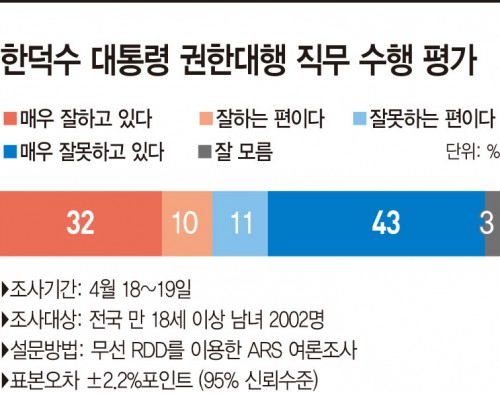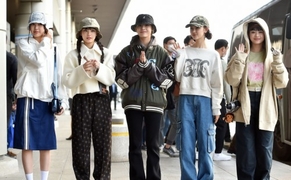 |
With just over 40 days remaining until the June 3 presidential election, acting President and Prime Minister Han Duck-soo has received a 42% approval rating for his job performance, according to a new public opinion poll.
The survey, commissioned by Asia Today and conducted by the Korea Opinion & Polling Research Association (KOPRA) on April 18–19, revealed that 42% of respondents said Han was doing his job well, while 55% gave a negative assessment.
Han, who is increasingly being discussed as a potential conservative alternative in the upcoming election, showed relative strength among centrist voters and residents in the Seoul metropolitan area — key demographics expected to determine the election outcome. His approval among self-identified moderates stood at 45%, slightly above the national average.
The political divide was stark: 70% of conservatives rated his performance positively, compared to just 14% of progressives.
Regionally, Han saw his strongest support in conservative strongholds: Daegu and North Gyeongsang Province (56%) and the Busan-Ulsan-South Gyeongsang region (48%). In Seoul, 43% gave positive marks, while the Gyeonggi and Incheon area saw 40% approval. In the central Daejeon-Sejong-Chungcheong region, Han recorded 39%.
Despite being from Jeonju in North Jeolla Province, Han earned a modest 27% approval rating in the traditionally liberal Gwangju and Jeolla region — a noteworthy figure that could position him as a conservative candidate capable of appealing to voters in the southwest.
During the last presidential election, then-candidate Yoon Suk-yeol recorded the highest-ever conservative vote share in the Jeolla region, including 14.42% in North Jeolla, 12.72% in Gwangju, and 11.44% in South Jeolla.
By party affiliation, 90% of People Power Party (PPP) supporters approved of Han’s job performance. He also received a 48% approval rating from supporters of the Reform Party, which has nominated Rep. Lee Jun-seok, and 39% approval among those aligned with the Progressive Party or other smaller groups.
Approval ratings by age showed the strongest support among voters aged 70 and older (65%), followed by those in their 60s (47%), 20s (46%), 30s (39%), 50s (33%), and 40s (29%).
The poll was conducted via mobile ARS using random digit dialing (RDD), with a margin of error of ±2.2 percentage points at a 95% confidence level. The response rate was 7.6%, with 2,002 respondents drawn from 22,437 calls. Results were weighted by gender, age, and region based on resident registration data from the Ministry of the Interior and Safety as of March 2025. Full details are available on the website of the National Election Survey Deliberation Commission.
Most Read
-
1
-
2
-
3
-
4
-
5
-
6
-
7





















